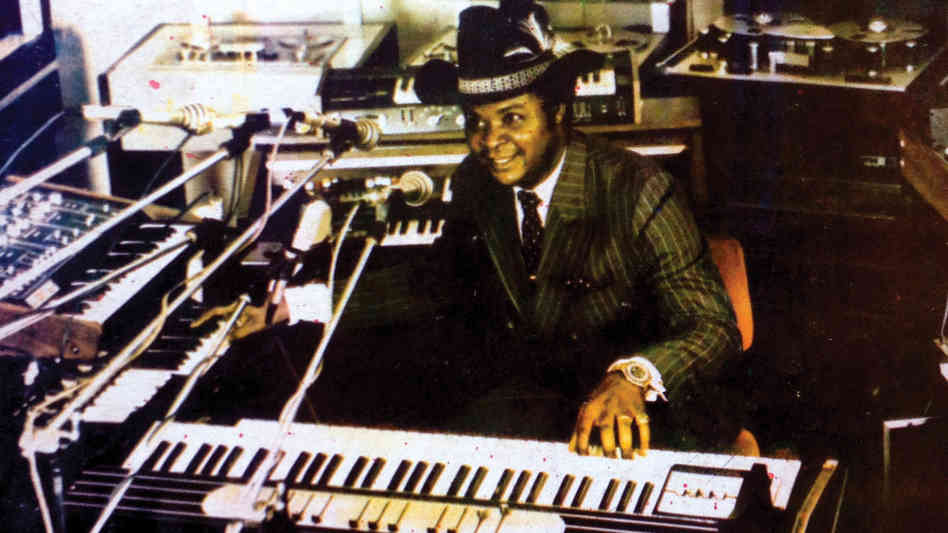 About 40 years ago, an African musician named Fela Kuti started gaining notice across the world. He quickly became the de facto ambassador for what was labeled Afrobeat: a funky, jazz and rock influenced music, loaded with rhythms, horns and barbed lyrics, skewering people in power. Indeed, they also often landed him in trouble with the authorities.
About 40 years ago, an African musician named Fela Kuti started gaining notice across the world. He quickly became the de facto ambassador for what was labeled Afrobeat: a funky, jazz and rock influenced music, loaded with rhythms, horns and barbed lyrics, skewering people in power. Indeed, they also often landed him in trouble with the authorities.
His success was such it remains the sounds most associate with African music. He also just about eclipsed everything else coming out of Africa at the time. But in recent years, this has been remedied. From the Analog Africa-released compilations covering everything from psychedelic rock to soul music and Soundway Record’s compilations of blues to dance and everything in between, it’s getting easier than ever to explore .
My favourite was Luaka Bop’s collection, Love’s A Real Thing. It collected a bunch of funky, rocking and unfortunately obscure music from the 70’s. One if the best cuts there was also one of the weirdest: “Better Change Your Mind”, an extended protest song by William Onyeabor, who’s music sounds like some bizarre mix of Kraftwerk, Sly Stone, and Prince. It’s unmistakably unique and catchy as hell.

Nearly ten years later, Luaka Bop has tracked down the cream of Onyearbor’s music and collected it onto one collection: Who Is William Onyeabor?
Who indeed? We know just a few details: he likely studied film making in Russia and released a bunch of albums in the late 70’s through the mid 80’s. It’s possible he even played all the instruments himself; the few photos of him at work show him seated at banks of keyboards, several mics at the ready. At some point, he became a born-again Christian, left music behind and became a successful businessman. Everything else is rumors, whispers and outright fiction. While he’s still alive, Onyeabor refuses to talk about his past, even to the people collecting his music.
And what a collection this is. The music’s as essential as it is mysterious. It’s alternately funky, futuristic and gritty. It manages to sound both familiar and alien, sometimes even at the same time. Several of the songs stretch into the ten-minute mark, with stabs of electric piano and guitar. The relentless grooves on “Atomic Bomb”,” Love is Blind”, or “Let’s Fall in Love” are burners. This album is as funky as anything that came out this year.
That’s not even getting into his lyrics. Take “Something You Will Never Forget”: over a funky Afrobeat groove, complete with bleating saxophone, Onyeabor reminds listeners of their ultimate fate. “I want to tell you something, something you will never forget,” he sings, “One day you’re be lying dead.” It’s a cautiously optimistic reminder to enjoy things while you still can. I think. Remember, living in Nigeria in the 70’s was no picnic: a brutal civil war had ended just years earlier.
War is a theme on several of these tracks: “Why Go to War”, where he sings “why go to war? Why not find peace?” over a wiry guitar riff, drums and a ton of keyboards. Later “Heaven and Hell More” brings pointed lyrics from Onyeabor: “When you see a good thing in this world, you try to change it,” he sings, “if you treat me the way you treated Jesus, I will send you all to Hell.”

One of the best cuts is “Fantastic Man”. After an opening that vaguely echoes The Doors’ classic “Touch Me”, it takes off to unfamiliar ground: thumping bass, jangling yet constantly shifting guitar and stabs of weird keyboards. It’s catchy in a way that sometimes sounds familiar, but only just. Onyeabor’s synth playing is out of this world, too: he kills it with a Moog solo.
Another favourite is “Good Name”, where the drum machine and keyboard riff sound a little like Kraftwerk, but stranger than anything those guys ever did. Or anything Kuti ever did, for that matter. And that’s before the guitar kicks in. And the lyrics! Onyeabor’s sings about how important your name is: “Good name is better than silver and gold, and nobody… can buy your name.”
Hearing this album in 2013 is insane. This music is so rooted in the past it seems hopelessly dated. Take the keyboards or drum machines: their warm, analog sounds on “Love is Blind” are positively ancient. On one level, this lends a certain charm to this album. But it’s also incredibly forward-sounding, too. Some of it takes afrobeat to new places. Other times, with a mix of his computerized keyboards and drum machine and funky basslines, it sounds like he just about invented techno.
When we ask who Onyeabor is, we’re really asking a bunch of questions. How did this music come to fruition? Who influenced him? How did he get all these instruments: the chunky drum machines and the warm analog synthesizers? And his skills in arranging, playing multiple instruments, and producing his own records: how did all this remarkable music come out, fully formed?
There are as many rumors as there are grooves on this album, but thanks to Onyeabor’s continued silence, few definitive answers. He seems more than willing to let his music speak for him. It speaks volumes: you can hear traces of everything from Sly Stone to Kraftwerk to Prince to, yes, Kuti here, but ultimately it stands alone from them. Do yourself a favour and pick this up. It might be the most essential re-release of the year.
Rating: 5/5


